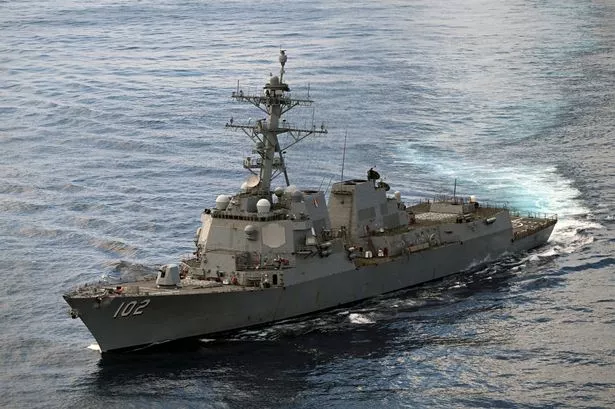World
Former Official Questions Military Focus on Venezuela Drug Trade

The recent deployment of U.S. Navy assets to the Caribbean to combat drug trafficking from Venezuela has drawn criticism from former government officials. Frank Rose, who served as Assistant Secretary of State for Arms Control, Verification, and Compliance under President Barack Obama, believes this military focus diverts attention from greater national security threats posed by countries such as China, North Korea, Russia, and Iran.
President Donald Trump ordered the Navy’s deployment in response to an escalating flow of drugs into the United States. Rose contends that the Navy would better serve U.S. interests if its resources were redirected to the Indo-Pacific and European regions, where the geopolitical landscape is rapidly evolving. He emphasized that the current focus on Latin America is misaligned with the more significant challenges presented by state-level adversaries.
Rose explained, “We are witnessing a revolution in warfare. From drone swarms in Ukraine to precision strikes in the Middle East, the world’s strategic situation is fundamentally changing.” He stressed that while drug trafficking is a pressing issue, the military is not the most effective means to address it. Instead, he advocates for enhanced law enforcement and intelligence capabilities to tackle narcotics-related challenges.
As Rose highlighted, the expansion of China’s naval capabilities is particularly concerning. He noted that China’s shipbuilding capacity is approximately 200% larger than that of the United States. This growth poses a direct challenge to U.S. interests in maintaining a free and open Indo-Pacific region. “My priority would be to deploy the U.S. Navy’s available assets to the Indo-Pacific as a deterrent to China,” he said, pointing out that China now operates more surface combatants than the United States.
Trump’s administration has shown a willingness to escalate military action in Venezuela, with discussions regarding potential strikes against drug-trafficking installations allegedly linked to Venezuelan leader Nicolás Maduro. While the president has hinted at military options, including ground invasions, the efficacy of such actions remains questionable. Rose remarked that the deployment of Navy assets to the Caribbean appears to lack a clear strategic objective, stating, “Honestly, I don’t know what the strategic objective of the deployment is.”
Recent military operations in the Gulf of Mexico and the Pacific Ocean have resulted in the destruction of vessels allegedly transporting drugs, leading to the death of over 60 individuals. Rose argues that these actions do not align with a coherent national security strategy. He emphasized the need for the Pentagon to concentrate on deterring state threats rather than pursuing drug traffickers.
The challenges inherent in deploying aircraft carriers were also addressed by Rose. He explained that the USS Ford, currently in the Caribbean, is part of a limited pool of naval resources. “We have a limited number of aircraft carriers that are deployable at any time,” he stated. With 11 aircraft carriers in commission, only about half are typically available for deployment.
Rose concluded by urging a shift in focus for U.S. military efforts. He advocates for a concentrated approach that prioritizes deterring threats from state actors while allowing law enforcement and intelligence agencies to manage other issues. “Let’s keep our war fighters focused on the threats that only they can deter,” he said, emphasizing the importance of a strategic allocation of military resources.
As the situation continues to unfold, the debate over the appropriate military response to drug trafficking and the broader implications for national security remains a critical issue for U.S. policymakers.
-

 Science2 weeks ago
Science2 weeks agoIROS 2025 to Showcase Cutting-Edge Robotics Innovations in China
-

 Politics2 weeks ago
Politics2 weeks agoJudge Considers Dismissal of Chelsea Housing Case Citing AI Flaws
-

 Lifestyle2 weeks ago
Lifestyle2 weeks agoStone Island’s Logo Worn by Extremists Sparks Brand Dilemma
-

 World3 weeks ago
World3 weeks agoBravo Company Veterans Honored with Bronze Medals After 56 Years
-

 Health2 weeks ago
Health2 weeks agoStartup Liberate Bio Secures $31 Million for Next-Gen Therapies
-

 Health3 weeks ago
Health3 weeks agoTop Hyaluronic Acid Serums for Radiant Skin in 2025
-

 Top Stories2 weeks ago
Top Stories2 weeks agoIndonesia Suspends 27,000 Bank Accounts in Online Gambling Crackdown
-

 World2 weeks ago
World2 weeks agoHoneywell Predicts Record Demand for Business Jets Over Next Decade
-

 Sports3 weeks ago
Sports3 weeks agoMel Kiper Jr. Reveals Top 25 Prospects for 2026 NFL Draft
-

 Lifestyle3 weeks ago
Lifestyle3 weeks agoMary Morgan Jackson Crowned Little Miss National Peanut Festival 2025
-

 Sports3 weeks ago
Sports3 weeks agoYamamoto’s Mastery Leads Dodgers to 5-1 Victory in NLCS Game 2
-

 Science3 weeks ago
Science3 weeks agoArizona State University Transforms Programming Education Approach









